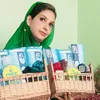This ‘Padman’ of Kashmir wants to start conversations around menstrual health and hygiene
Peerzada Aquib Nazar, besides supplying organic sanitary pads across the Valley also wants to launch an app to focus on menstrual health.
Twenty-eight-year-old Peerzada Aaqib Nazar started his organic and eco-friendly napkins unit to promote safety and menstrual hygiene among women in the Kashmir Valley.
After completing his BTech from Chandigarh in 2016, Aaqib joined a multinational corporation (MNC) in Dubai as a civil engineer. In April 2019, he returned to Kashmir and invested Rs 30 lakh in a project to sell organic sanitary napkins to women in the Valley.

“On my return to Kashmir I entered into a casual discussion with a gynecologist on board a Dubai-India flight, I was surprised to know that companies were using plastics and toxic chemicals in the sanitary napkins, which is one of the biggest reasons for cervical and ovarian cancer in Kashmir. Therefore, I decided to start importing eco-friendly organic pads from different countries and later I started selling them under the brand name Sehha (Arabic for health). These napkins are 100 percent cotton and organic,” Aaqib tells HerStory.
Plastic, he says, is a cheap raw material and available in abundance, whereas organic raw material is expensive and difficult to procure.
Seha is available in departmental stories and medical stores across the Valley. He sells them online through the website www.sehaorganics.com.
Padman of Kashmir
“I am honoured to be known as the Padman of Kashmir. In the beginning I met with a lot of criticism from family and friends but now that I am doing well, I receive a lot of support in my venture,” Aaqib says.
Since they are made of cotton and completely plastic-free, the pads are sold at Rs 45 for a pack of six, slightly higher than other non-organic brands available in the market.
Not just content with distributing organic sanitary pads, Aaqib is also working on a mobile app to help girls keep track of their periods so that they can be well prepared.
It is estimated that around 120 million menstruating adolescents in India experience menstrual dysfunctions that affect their normal daily chores. But only 36 per cent of its 355 million menstruating females use napkins. According to a report by NGO Dasra, yearly, 23 million girls stop going to school as soon as they start menstruating.
He adds: “People still largely think that it is immoral to discuss women's periods and the silence basically means that women in general don't feel comfortable talking about reproductive health issues. Even if they have a minor issue like a fungal infection, they are not comfortable discussing it and the infection goes untreated, impacting the overall well-being of women. The need of the hour is to remove the taboo, which has been associated with women's periods, childbirth and women’s health on the whole.”
During the pandemic, he claims to have provided 700 boxes of sanitary napkins to quarantined students. He has also provided masks, gloves, and other necessary items to health care workers besides delivering sanitary products to almost every nook and corner of the Valley.
Edited by Rekha Balakrishnan








